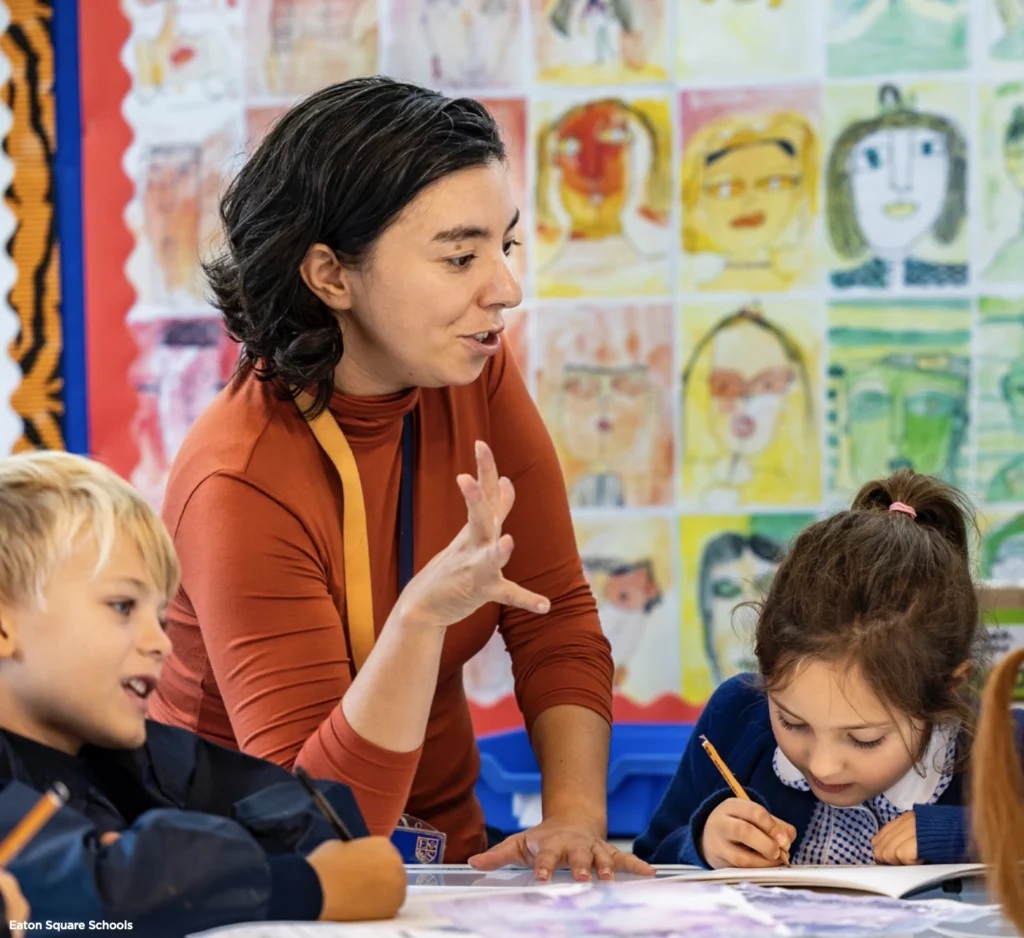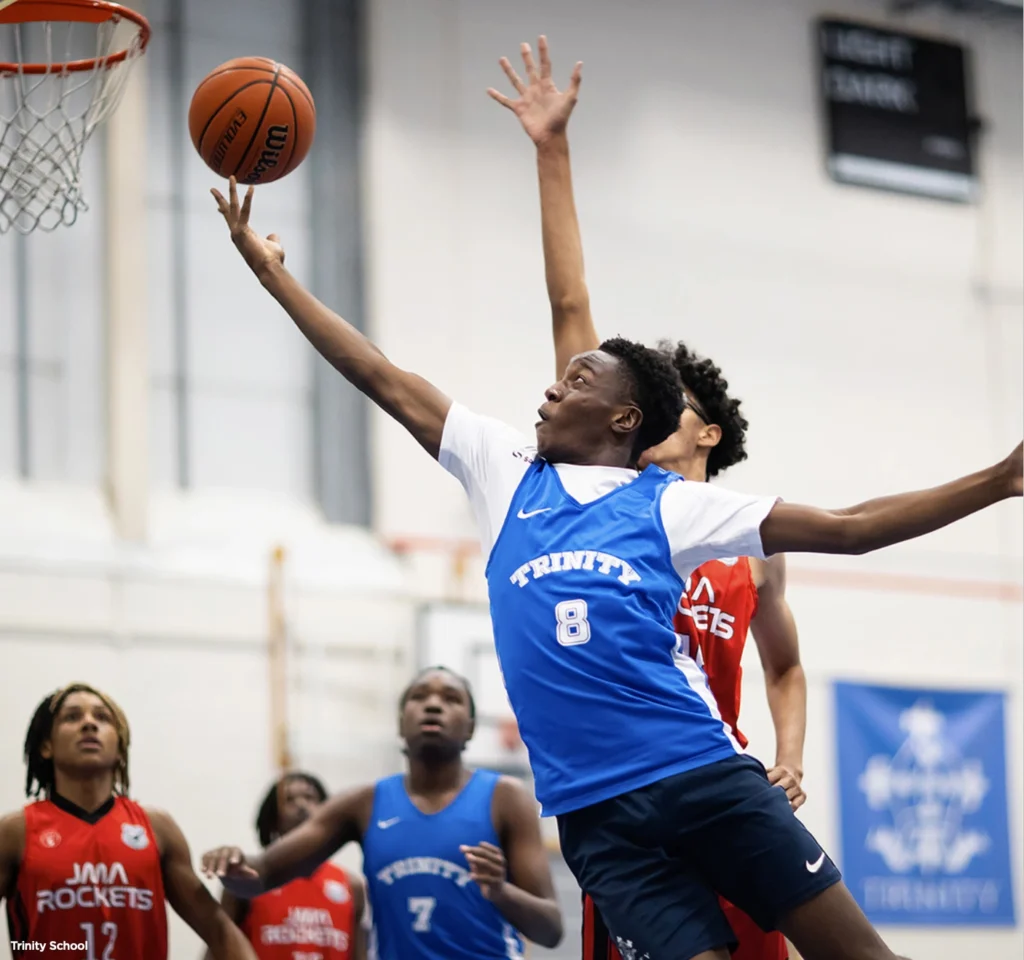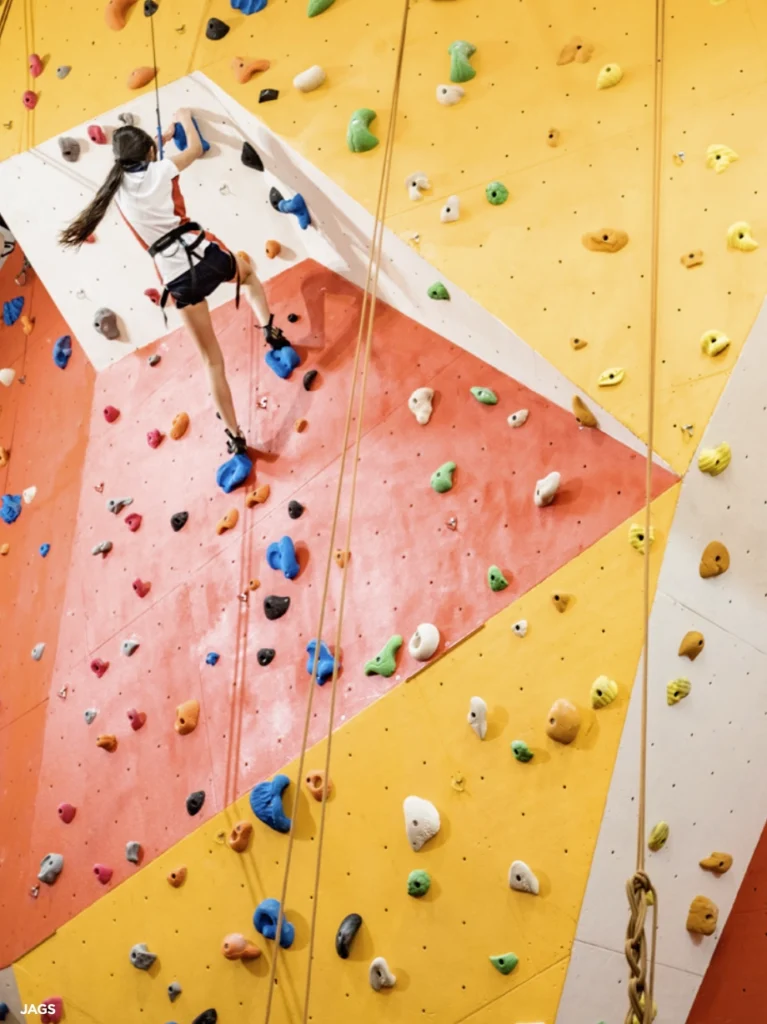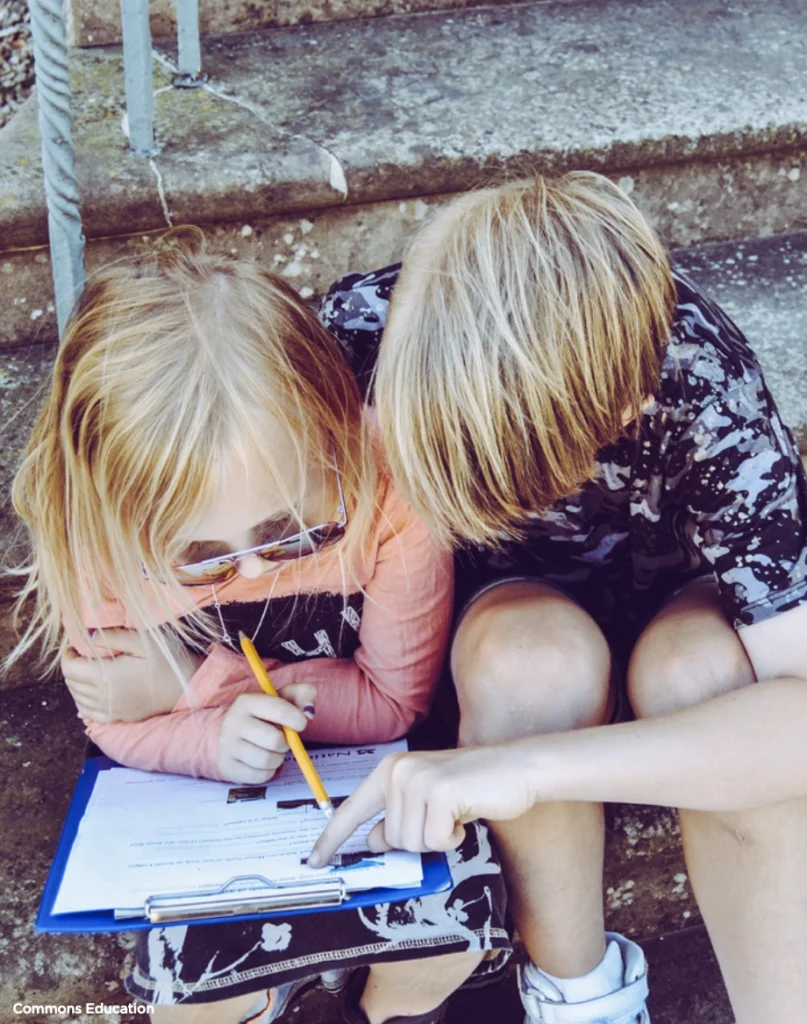1st August 2024 · Latest News
Fears are growing that children living long hours online are more at risk of harm than was previously thought. Many have read a new book called The Anxious Generation by psychologist Jonathan Haidt and taken on board its argument – that smartphones and social media apps lead to sleep deprivation, mental illness and addiction for children. Children can also be groomed online to ‘sext’ – send intimate photos of themselves – leaving them vulnerable to blackmail.
REVERSING THE MOODY BLUES
At Emanuel, we run an initiative called ‘Disconnect to Reconnect’ where pupils reduce their use of social media over a three-week period and report the impact on their mood. Pupils notice an improvement in mood, happiness and sleep, amongst other positive changes to their wellbeing. Importantly, they have also gained a degree of
agency over their use of social media and have become advocates for moderation. We use our form assemblies to run ‘decompression sessions’ in the middle of the day where pupils have the opportunity to do something fun and exciting, whether it be playing a form game of giant Jenga, creating an origami jumping frog and measuring the jump span, or a ‘drop the egg’ competition. These sessions help pupils to retain a sense of balance and perspective in their studies while having fun and reinforcing the importance of wellbeing.Source: Emanuel School

Cathy Elliott, Headteacher of Streatham & Clapham High School has told parents to buy phones for children only when “absolutely necessary” and then to opt for brick phones – old style practical phones which can be used to text but not to access the internet.
Putney High School says, “Phones are not permitted at Putney High School during the school day.” The school is using “lockable phone pouches to help pupils step away from the addictive challenges of digital technology.”
Wimbledon High School has boxes where students must lock away their devices all day while Emanuel School in Battersea, for 11-to-18-year-olds, has announced a smartphone ban for the incoming Year 6 with the goal of being smartphone-free for Years 6 to 9.
Emanuel’s Mr Kothakota, Deputy Head: Pupils & Designated Safeguarding Lead, explains that the school runs an initiative called Disconnect to Reconnect to reduce pupils’ use of social media over a three-week period and report the impact on their mood. “Pupils notice an improvement in mood, happiness and sleep, among other positive changes to their wellbeing.
“Importantly, they have also gained a degree of agency over their use of social media and become advocates for moderation.”
Pupils notice an improvement in mood, happiness and sleep, among other positive changes to their wellbeing

As schools start a new academic year, bans on smartphones are just one of many changes made since the outbreak of Covid 19 caused the biggest upheaval to schooling since the Second World War.
THE MEANING OF METACOGNITION
The term metacognition means having the self-awareness to make choices about the sort of thinking that you do, or to reflect on the sort of thinking that you have undertaken. It assumes that acts of thinking are deliberate and free, and aligned with the will to learn and reflect on your thoughts.
How can a pupil use metacognition?
The sort of metacognitive questions that may help a pupil to plan his or her learning may include:
- What do I want to learn?
- How will I do it?
- What challenges may I face?
- What skills, values or resources do I need?
While they are learning:
- Do I understand what I am learning?
- Do I need to try a different strategy?
- What am I finding difficult?
If pupils notice that some thought or other is ‘stuck’, then they may pause, take a breath and change their approach.
Source: Eaton House The Manor
With record numbers of children now persistently absent from school – 24% missed a day a fortnight in the autumn term of 2023 – mental health continues to be at the forefront of school agendas. Figures from NHS Digital show that one-in-six children in England had a probable mental health disorder in 2021, an increase from one in nine in 2017.
Many schools offer avenues to try to help children feel secure. At Dulwich College Mrs Fiona Angel, Senior Deputy, says pupils can turn to their tutor for advice initially. “There is [also] an extensive network of other channels of support, including the Head of Year, Head of School, College Chaplain, counselling team, and our Yelcho Room, a
drop-in safe space for pupils to express any worries or concerns.”
But if anxiety becomes so disabling that children start avoiding school Kathryn Lester, Director of the Childhood, Attachments, Play and Emotions Lab at Sussex University, says parents should work closely with teachers to get children back to class swiftly.

“We know that in the long-term, avoidance acts to maintain anxiety – so while not attending school might offer temporary relief to the child from the distress they feel, it is likely to reinforce the anxiety and lead to prolonged absence,” she says.
Headteachers have also recognised the pressure on younger children caused by highly competitive admission tests to senior fee-paying schools. Since 1903 the Independent Schools Examinations Board has provided exams for children moving from prep and junior schools to senior schools in the UK, including designing and setting Common Entrance tests. The
exams have traditionally tested 12- and 13-year-olds on up to 11 academic subjects, including maths and classics. But now changes are afoot.
SCHOLARS – THE ‘IDEAS-MAKERS’ OF THE FUTURE
Academic with a very modern edge, Putney’s ethos of Modern Scholarship is a forward-thinking approach to study which is original and relevant to the modern world. Students learn to think critically, build real world skills and competencies, and develop the vision to problem-solve, now and in the future.
With academic rigour, analytical skills and a distinctly entrepreneurial style of thinking, they are encouraged to be curious, to question and conjecture, inside the classroom and beyond, starting with the popular Year 7 Badge Challenge and Year 8 BAFTA awards. Students explore new ideas and respond creatively to topical issues through essays and artworks, podcasts and short films. In the Debating Forum and PPE, they discuss modern day ethics while a bespoke Design Thinking curriculum explores design innovation, robots and AI in real world applications. They brainstorm and prototype sustainable solutions to real world problems – great training for the innovators of tomorrow.
Source: Putney High School GDST
In 2019, just before the pandemic started, the ISEB announced that Britain’s oldest exams were to be reformed. Hot-housing and intensive coaching for admissions tests to highly selective senior schools had also been blamed for growing levels of anxiety in young children.
The board has brought in online pre-tests to Common Entrance. Pupils in Year 6, aged 10 and 11, can sit the computerised pre-tests in their primary and prep schools as well as take a new iPQ, a project-based qualification devised by the ISEB.
Prep and junior schools are adjusting the way they teach to the new qualifications. Some prep schools have adopted a pre-school baccalaureate, an alternative framework of assessment to Common Entrance which includes measuring skills in technology and critical thinking. Some senior schools will accept the PSB on its own, others use it alongside pre-testing of CE exams.
Some prep schools have adopted a pre-school baccalaureate, an alternative framework of assessment to Common Entrance

The PSB website, www.psbacc.org, lists the prep schools that offer the PSB and the senior schools that accept it. Michael Hamilton-Foyn, Deputy Head Academic, Walhampton says: “Our world is changing and children need to develop the right knowledge, skills, attitudes and values, but crucially they need to ask the right questions. Curiosity is key to learning, both in terms of developing subject knowledge and mastery of skills but also in developing an interest in how we learn and how we improve ourselves as learners. “Walhampton’s inclusion of PSB skills as a fundamental part of the curriculum nurtures this ‘metacognition’ and empowers children to have greater control over their success.”
WHAT TO CONSIDER FOR A MODERN EDUCATION
Alongside traditional academics, other important skills in a rapidly changing world are:
1. Holistic development: Looking beyond academic tests and cultivating essential life skills like critical thinking, communication and problem-solving
2. Digital literacy: Mastering digital tools and platforms with technology integrated into learning
3. Adaptability and resilience: Encouraging experiential learning, challenging students to solve real-world problems and foster a growth mindset
4. Cultural awareness: Celebrating diversity and promoting cultural understanding, with exposure to different perspectives, global issues and meaningful cross-cultural interactions
5. Empathy and sustainability: Empathy towards others and the promotion and practise of environmental stewardship
6. Communication and collaboration: Developing skills in students and engaging in projects, debates and teamwork
7. Entrepreneurship and financial literacy: Preparation for career and economic success
8. Support for individuality: Personalised guidance to nurture a child’s talents and interests, while accommodating diverse learning styles and opportunities for enrichment
9. Community and values: Ensure the school’s community ethos and values align with your own
10. Future readiness: Look for alumni success, partnerships with industry and initiatives that promote lifelong learning and adaptabilitySource: London Park Schools (LPS)
Walhampton currently retains the Year 8 summer tests as a way of ensuring rigour and quality assurance. It also affords children practise at revising for, and taking, an exam in a formal setting. This is great preparation for the years of national tests that will follow the pupils’ transition to senior schools.
“As part of our curriculum development programme, we spoke to every senior school that we have sent a child to over the last decade and all were fully supportive of our PSB implementation plans; Walhampton pupils continue to be highly sought-after.”
For families with children who may have been home for months or even years post-pandemic, Hybrid@LPS, the first hybrid school in the UK teaching children up to sixth form age, opens this month (September 2024). Dukes Education, which runs around 25 schools in the UK and Europe, will ask students to come in one day a week for lessons in subjects like art, science, drama and sport, and log into live online lessons from home on the other four days.
Our world is changing and children need to develop the right knowledge, skills, attitudes and values…”

Hybrid@LPS is linked to the London Park Schools that Dukes is opening in London, including LPS Mayfair, LPS Clapham and LPS Sixth (currently Eaton Square Senior and Eaton Square Sixth).
The hybrid school will charge around £4,000 – £5,000 a term. With Labour pledging to bring in a 20% VAT charge on private schools and some schools saying they plan to pass on most of that to parents in higher fees, Suzie Longstaff, Principal of London Park Schools, says her aim is to support parents by “trying to make education affordable”.
Smaller schools – and most private schools are small, with less than 300 pupils – are expected to find the VAT charge hardest to manage. Experts estimate that as many as 25% of parents will leave the sector over five years and some schools will have to close.
At The White House Preparatory School, a 250-pupil school in Clapham which offers an after-school club in stockbroking and Latin among other subjects, Vice Principal Grace McCahery has launched a coalition of small schools to ask the government to exempt schools as small as hers from paying the charge.
Like others, McCahery is drawing up contingency plans to handle the extra tax thought likely to come in from September 2025. She is ruling out job cuts or cuts in bursaries which are offered to around 100 pupils at The White House but other schools, especially outside London, are looking hard at such options.
TIPS FOR STUDYING FROM HOME
- Create a study zone: A dedicated area to focus without distractions
- Stick to a routine: Establish a consistent schedule for your work when not in lessons
- Manage distractions: The phone and social media are key culprits. Use apps that block distractions during study sessions
- Stay connected: Participate in discussions with your classmates and tutors, ask questions and collaborate on projects
- Take regular breaks: Short breaks during study sessions to rest and recharge boosts concentration and productivity
- Stay organised: Use digital tools to keep on top of your workload such as calendars or task lists – organisation is key
- Look after yourself: Eat well, exercise, get fresh air and enough sleep. Wellbeing directly impacts the ability to learn effectively from home
- Prepare for tech issues: Be ready for internet outages or device problems; know who to contact for technical support
- Manage time wisely: Prioritise tasks based on deadlines. Allocate specific times for different subjects or assignments
- Seek help when needed: Don’t hesitate to ask questions of classmates or teachers – they’re there to support you
Source: Hybrid@LPS
McCahery says keeping class sizes small is also a priority, but many parents expect class sizes in private schools to grow if the government carries out its manifesto pledge.
The threat of bigger class sizes and redundancies in the private sector are adding to teacher stress which has already resulted in recruitment and retention difficulties in many schools, both state and private.
In response, schools are trying hard to recruit and keep good teachers, with rules for parents such as only contacting teachers between 9am and 4pm.

“We have rules about when you can email the teacher,” says McCahery. “We strive to maintain their work-life balance. Nobody needs to send an email at 11pm or 7am.” Another measure to alleviate teacher and headteacher stress involves reforms to the school inspectorate Ofsted, also expected to be brought in now that Labour is in government. The single word judgements on schools of “outstanding”, “good”, “requires improvement” and “inadequate”, labels by which many parents currently choose schools, will be scrapped, and replaced with something more like a descriptive report card.
The move has been called for by teaching unions after respected headteacher Ruth Perry killed herself after her previously outstanding primary school was downgraded to inadequate.
Meanwhile, girls continue to outperform boys at both GCSE and A-level. For years, the leaders of single sex schools have argued that teenage girls and boys perform better when they are taught separately, with girls more likely to study STEM subjects such as maths and physics at A-level in girls- only schools and boys more likely to feel confident opting for English Literature, or dance and drama in boys-only schools.
TIPS FOR FRIENDSHIP AND SUCCESS
Wellbeing and pastoral care are top priorities for parents given the rise in mental health issues among adolescents. We create spaces where every pupil feels comfortable, valued and accepted, and given the tools to take ownership of their wellbeing. Tips to help foster a sense of community and belonging are:
Encourage self-expression: Empower your child to embrace their identity and express it freely. Celebrate their individuality and remind them that their identity goes beyond school and into all areas of life.
Join or start clubs: Beyond sports, music and art, clubs like Fishtank Club, Swifty Club or Warhammer can help children with unique interests find common ground and make
friends. Encourage your child to join.Promote security: Help your child feel secure during adolescence, crucial for success both in school and in life.
By supporting your child in these ways, you can help them build strong friendships and a foundation for lifelong success.
Source: Alleyn’s School
However, a growing number of boys schools in particular are now moving to enrol girls and vice versa, arguing that boys and girls will have to work together in their careers – so need to learn how to get along from an early age.
Nonetheless, differences between boys’ and girls’ behaviour are constantly being discussed in schools with implications for how they should be taught.
At Broomwood, for instance, where the boys’ prep school is now in co-educational collaboration with the girls’ prep, Louisa McCafferty, Head of Broomwood Prep – Girls says: “When Broomwood conducted our wellbeing survey it threw up issues that we weren’t necessarily expecting. We were able to address problems at our girls’ school, such
Another measure to alleviate teacher and headteacher stress involves reforms to the school inspectorate Ofsted

as identifying and tackling problems with sleep. And after listening to our boys, we gave them more control and responsibility over setting expectations of behaviour and consequences. Both these steps have had a huge benefit to the children giving them a sense of control and confidence that we are listening to them.”
There are likely to be changes down the line to the curriculum. The new government has proposed a review of what is currently taught in schools – expect to see discussion of a more diverse curriculum with more study of literature by black and ethnic minority authors, as well as of notable figures in subjects ranging from history to science and the possibility of bringing in more technical subjects such as digital skills and engineering.
EMBRACING INNOVATION IN EDUCATION
Equipping students with the skills they need to thrive in a rapidly changing workplace is crucial. The World Economic Forum published the top ten skills of the future:
1. Analytical thinking and innovation
2. Active learning and learning strategies
3. Complex problem-solving
4. Critical thinking and analysis
5. Creativity, originality and initiative
6. Leadership and social influence
7. Technology use, monitoring and control
8. Technology design and programming
9. Resilience, stress tolerance and flexibility
10. Reasoning, problem-solving and ideationWhen looking at schools, ask how they are developing and rising to these changes beyond the traditional curriculum. How are they embracing technology? What is innovative about their curriculum? What additional opportunities do they offer students to help them grow and develop?
Source: DLD College London
New education secretary Bridget Phillipson has said she will review the curriculum, giving subjects such as art, music, drama and sport, subjects known to help children with their mental health, a higher priority in the school timetable.
Oracy and early maths will also feature in any review as will a greater emphasis on digital skills.
There is widespread agreement about the narrow specialisation of A-levels not equipping youngsters for a 21st century world of work. The new government
The new government has proposed a review of what is currently taught in schools

supports more art, sports, drama and music in the curriculum – subjects that help children catch up on the social and emotional learning they missed in lockdown. Climate change is also on many schools’ minds with a new GCSE in natural history now up and running and many schools offering sustainable volunteering initiatives to children.
Meanwhile, a boom in pupils studying science, technology and maths subjects at GCSE and A-level in recent years, encouraged by the government, has led to computer science becoming the most popular university degree.
Schools are trialling new ways of learning to keep abreast of offices where AI and robots will perform many of the tasks humans currently carry out. Whitgift, for example, is trialling triangular desks for students instead of in rows facing a teacher at the front of the class.

At Whitgift School James Piggott, Director of Learning says: “In modern education it’s not enough just to learn how to solve problems, but to mix with people who have different life experiences and perspectives.
A GUIDE TO FAILING FORWARDS
Accept that making mistakes and failing is inevitable. We don’t make them on purpose, but they happen, and so we should value them when they do.
Analyse
Why did the mistake or failure happen? Was it speed, lack of knowledge, incorrect use of knowledge, wrong time/ wrong place? Examine why the failure happened and what learning can be taken from it.Feel
There are so many feelings wrapped up in making mistakes and it’s OK to feel them, to be disappointed or angry. Name them and explain them but set a realistic time limit for this.Make a plan
Ask yourself, ‘How will I approach this next time?’ or ‘What am I going to do next?’ Ultimately, use what you have learnt to fail forwards.Source: Finton House School
“We’re moving away from the traditional classroom seats in rows as students need to lead lessons and rows are prohibitive to discussion. See where the teacher is in the room over the next few years, and increasingly it won’t be in the front but in the middle or back.”
He explains: “We are going to start a small trial for two terms with triangular-shaped desks. Their shape fundamentally changes the dynamic of a classroom – putting a number of them together means you have a classroom of curved grouping where students are face-to-face with their peers.”
In modern education it’s not enough just to learn how to solve problems

PASTORAL IS KEY
Broomwood places a huge emphasis on listening to children and addressing their needs. Each year we conduct a pupil wellbeing survey and were delighted that most describe themselves as ‘very happy’. When issues do arise, we are proactive and address them quickly. For example, in our last survey we discovered that some older girls were finding it difficult to sleep, which made it harder to concentrate in lessons and regulate their moods. This prompted us to organise pupil and parent workshops, providing tips on how to get a good night’s rest. Girls from Year 5 onwards also choose their own tutor, identifying teachers they have a good working relationship with and who they believe can champion them through the year. They meet twice a week to discuss academic concerns and any pastoral or social issues, and the tutor is on hand to offer support at every stage.
Source: Broomwood Prep – Girls
